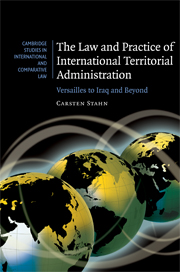Book contents
- Frontmatter
- Contents
- Foreword
- Preface
- Selected table of cases
- List of abbreviations
- Table of engagements
- Introduction
- Part I The historical and social context of international territorial administration
- Part II The practice of international territorial administration: a retrospective
- Part III The foundations of international territorial administration
- Part IV A typology of legal problems arising within the context of international territorial administration
- Introduction
- 13 The legal status of the administered territory
- 14 The status of international administering authorities
- 15 The exercise of regulatory authority within the framework of international administrations
- 16 The relationship with domestic actors
- Part V International territorial administration at the verge of the twenty-first century: achievements, challenges and lessons learned
- Bibliography
- Index
- CAMBRIDGE STUDIES IN INTERNATIONAL AND COMPARATIVE LAW
14 - The status of international administering authorities
Published online by Cambridge University Press: 19 January 2010
- Frontmatter
- Contents
- Foreword
- Preface
- Selected table of cases
- List of abbreviations
- Table of engagements
- Introduction
- Part I The historical and social context of international territorial administration
- Part II The practice of international territorial administration: a retrospective
- Part III The foundations of international territorial administration
- Part IV A typology of legal problems arising within the context of international territorial administration
- Introduction
- 13 The legal status of the administered territory
- 14 The status of international administering authorities
- 15 The exercise of regulatory authority within the framework of international administrations
- 16 The relationship with domestic actors
- Part V International territorial administration at the verge of the twenty-first century: achievements, challenges and lessons learned
- Bibliography
- Index
- CAMBRIDGE STUDIES IN INTERNATIONAL AND COMPARATIVE LAW
Summary
The status of international territorial authorities varies from case to case. Some international administrations are comparable to traditional peacekeeping missions. Other administrations, however, come much closer to classical state authorities within the exercise of administering powers. This creates difficulties in two areas: the scope of application of privileges and immunities and the accountability of international territorial administrations.
The practice of international administration requires new thinking in the area of the law of immunity and the treatment of the accountability of international organisations more generally. Two arguments shall be developed in greater detail here. There is compelling evidence that the principle of functional immunity, which is largely based on operational necessity, cannot be applied to international administrations which exercise powers of government. An absolute standard of jurisdictional immunity collides in such cases with the governmental and human rights responsibilities of the international administration towards the inhabitants of the administered territory.
Secondly, the development of international governance mechanisms creates a need for greater diversity in institutional accountability. A distinction may be made in relation to the type of international administration. Traditional forms of accountability based on intra-institutional control or international monitoring are acceptable in the context of governance assistance missions. The exercise of governmental authority with direct powers over individuals, by contrast, requires basic forms of responsibility towards domestic or quasi-domestic actors.
The conceptual move: from external to internal responsibility
International organisations typically perform functions which are international in nature and detached from the domestic legal order of states.
- Type
- Chapter
- Information
- The Law and Practice of International Territorial AdministrationVersailles to Iraq and Beyond, pp. 579 - 644Publisher: Cambridge University PressPrint publication year: 2008



